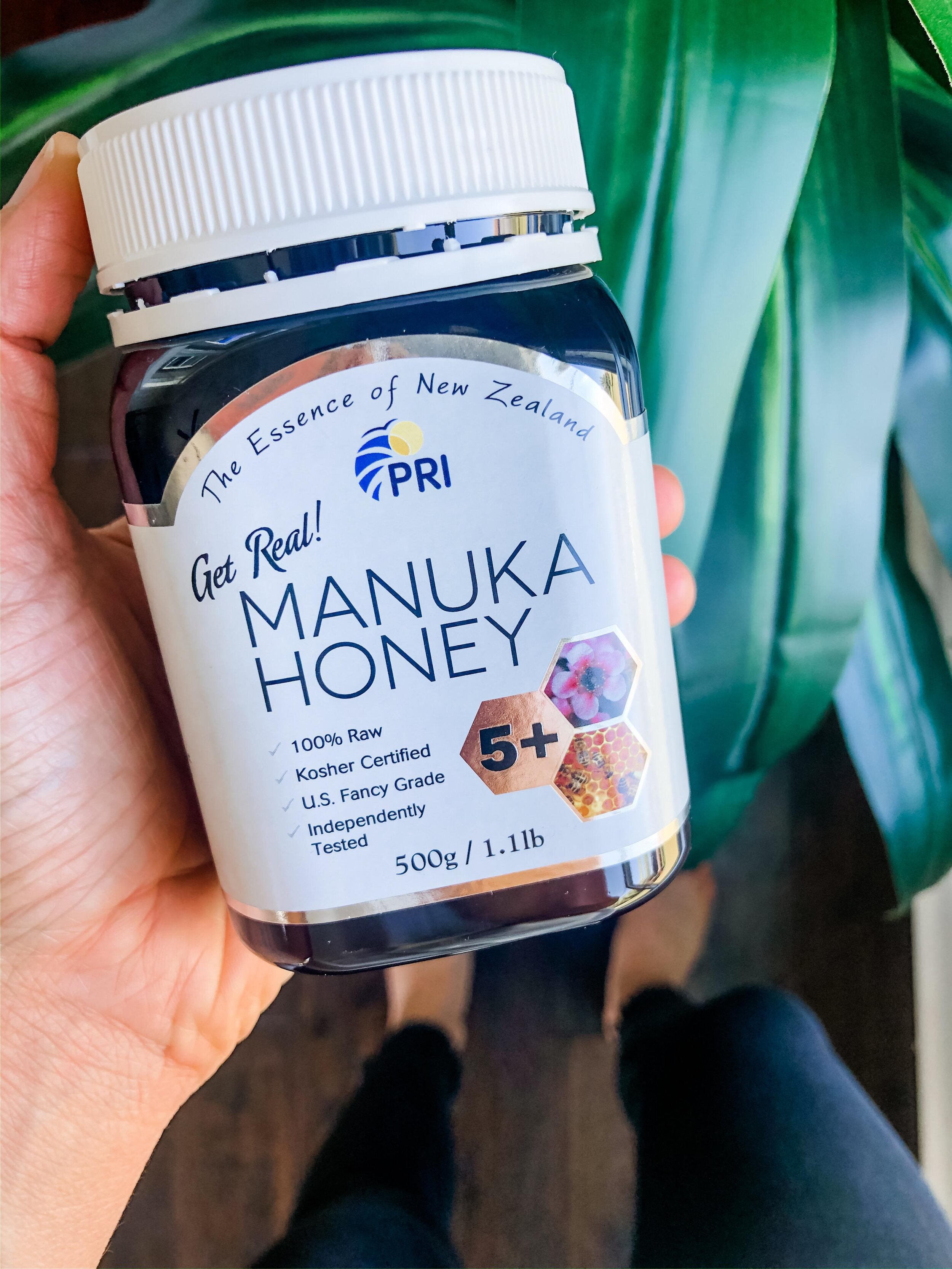Manuka Honey: Breaking Down the Benefits + Common Questions
We’re a family who loves honey...we bake with it, top it on smoothie bowls and toast, add it to our tea, and eat it straight out of the jar for all the many health benefits.
Unlike other honey, Manuka honey is used more as medicinal honey vs something you’d bake with.
But unfortunately, there’s a lot of confusion about honey and specifically manuka honey.
So I wanted to take some time to explain it’s benefits and why it’s different. Plus, I’ll answer some common questions about honey and whether it’s better to buy local (because of allergies). I’ll also break down why it has a higher price tag, a question I wanted to know the answer to as well!
What is Manuka Honey?
Manuka honey is made in Australia and New Zealand by bees that pollinate the native manuka bush.
You might be thinking, what’s the big deal with Manuka honey? Isn’t it just the same as regular honey?
Answer: No, it’s not!
Manuka honey is unique in that its active, antibacterial component, Methylglyoxal or MGO is the most effective and only found in Manuka Honey. Often referred to as Non-Peroxide Activity or NPA. No other honey has high levels of methylglyoxal which makes Manuka honey the most active and beneficial honey available today. It is used to treat a wide range of issues from wounds to digestive problems to coughs/colds.
It’s the antibacterial component that sets it apart and makes it superior to other honey.
Manuka Honey Benefits
If you’re new to manuka honey, prepare to be amazed with all of its amazing benefits. It has so many healing properties and uses. Here are just a handful of them:
Heals Wounds: Since ancient times, manuka honey has been used to aid in the healing of wounds, burns, and sores. In one study, researchers found that manuka honey can increase wound healing, enhance the regeneration of tissue, and even diminish pain from burns in patients.
Soothes a Sore Throat: Keeping manuka honey on hand when you’re struggling with a sore throat will provide relief. Manuka honey is especially good for this as opposed to other raw honey because it has antiviral and antibacterial properties that help reduce inflammation and soreness. It also coats the inner lining of the throat to help soothe the irritation.
Improves Digestive Issues: Manuka honey has even shown to help with digestion and can act as a prebiotic. And because it has anti-inflammatory properties it has been shown to help decrease the symptoms associated with irritable bowel syndrome (IBS).
Great for Skin: If you struggle with skin issues manuka honey is a great skin wash or face mask. It’s been known to nourish and smooth skin. Manuka honey is hygroscopic, which means that it draws moisture to the skin and helps lock in moisture.
Is Local Really Better?
You may have heard that you should buy your honey locally to really appreciate the benefits provided by honey or that it cures allergies. But you may be surprised but studies have actually disproven this. Local honey does not help with nor cure allergies.
One study looked at the effect of allergies using pasteurized honey vs local honey. The results, neither group who ate honey didn’t experience any relief from their seasonal allergies.
If you struggle with allergies it’s important to find things that help and really work. And that’s where manuka honey comes in to help support you with your allergy symptoms.
Manuka has powerful benefits that can relieve some of the symptoms from allergies like sore throats and inflammation. Manuka honey is antibacterial, supports the immune system and helps fight infections internally. So if you’re struggling with allergy symptoms, Manuka honey can help!
Why is Manuka Honey Pricier?
This is a really great question and one I actually had myself!
Why does Manuka honey have a higher price tag? The price really comes down to supply and demand. The plant has a very short flowering window and is often concentrated in remote areas. It’s difficult to harvest because the flower is only open for such a short amount of time. Then there are the testing and regulation costs to ensure that it’s the highest quality honey.
The grade of the manuka honey also plays a factor in the price. The better the grade, the higher the price and the higher the bioactive compounds like methylglyoxal which we learned above is the antibacterial component in Manuka honey.
Conclusion
After reading this I hope you realize just how amazing Manuka honey is. It provides so many powerful health benefits like keeping your skin healthy, improving gut health, healing wounds, and alleviating your next sore throat.
And I hope it cleared up any confusion around it. And if you’re still hung up on the higher price tag, for a jar of PRI Manuka honey 20+ it’s around 85 cents a teaspoon that’s about the same price as a ½ cup of black coffee at Starbucks (83 cents) and you’ll be getting so many medicinal benefits.
We love using it for all the amazing benefits it has, plus it tastes really yummy too! I can’t wait for you to discover Manuka honey for yourself.



